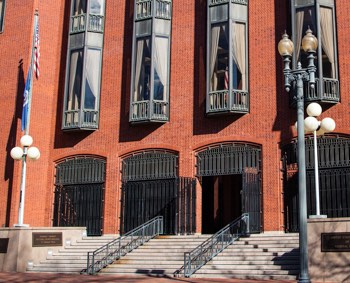 Mankes v. Vivid Seats Ltd. (Fed. Cir. Apr. 22, 2016) (Before Taranto, Schall, and Chen, J.) (Opinion for the court, Taranto, J.). Click Here for a copy of the opinion.
Mankes v. Vivid Seats Ltd. (Fed. Cir. Apr. 22, 2016) (Before Taranto, Schall, and Chen, J.) (Opinion for the court, Taranto, J.). Click Here for a copy of the opinion.
Robert Mankes sued Vivid Seats and Fandango for infringement of a patent related to inventory management systems. The accused system is one where local venues coordinate with Fandango and Vivid to facilitate online ticket sales. The local venue and defendants coordinate to ensure that each ticket sold locally and on the internet is accounted for, to prevent oversold theatres. Significantly, performing the steps of the patent claims require inventory management tasks that are done by the defendants, plus tasks by hundreds of local venues, none of whom are parties to the suit. As a result, Plaintiff’s infringement theory was one of divided infringement – where no one party was performing all the method steps and directly infringing.
These circumstances are similar to those in the Akamai v. Limelight Networks cases, which were pending when this lawsuit was filed. Here, the district court granted the defendants judgment on the pleadings by applying the standard in the Supreme Court’s Limelight Networks, Inc. v. Akamai Techs. (Limelight), which required that some party be liable for direct infringement. The district court also denied a request for attorney’s fees. The Plaintiff appealed the judgment on the pleadings, and the defendants cross-appealed the denial of attorney’s fees.
[Troutman-Ad]
During briefing for this appeal, the Federal Circuit decided Akamai III, which reinforced the defendant’s position. The Court held that a customer’s actions could only contribute to direct infringement if the defendant and their customers were in a joint enterprise. Then, three months later, the Court issued an en banc opinion reversing Akamai III by relaxing the standard under which the acts of a defendant’s customers could be attributed to defendants. The Court then held that “when an alleged infringer conditions participation in an activity or receipt of a benefit upon performance of a step or steps of a patented method, and establishes the manner of timing of that performance,” acts done by another may contribute to its own direct infringement.
In view of this change in the law, the Court vacated the judgment against Mankes and remanded the case for further consideration. Because the law was in a state of flux, the Plaintiff pled facts that arguably would have supported an infringement theory under the law applicable when it was filed. The plaintiff could not have known the facts necessary to support a complaint under the law as it exists now. Because of this, the Court declined to affirm or reverse, and instead remanded the case to the district court for reconsideration under the new standards. Presumably, this would also give the Plaintiff an opportunity to amend the complaint. Further, because the adverse judgment against the plaintiff was vacated, the Court likewise affirmed the denial of an award of attorney’s fees.
Parker Hancock also contributed to the writing of this summary.
[Troutman-About]

![[IPWatchdog Logo]](https://ipwatchdog.com/wp-content/themes/IPWatchdog%20-%202023/assets/images/temp/logo-small@2x.png)


![[Advertisement]](https://ipwatchdog.com/wp-content/uploads/2024/04/UnitedLex-May-2-2024-sidebar-700x500-1.jpg)
![[Advertisement]](https://ipwatchdog.com/wp-content/uploads/2024/04/Artificial-Intelligence-2024-REPLAY-sidebar-700x500-corrected.jpg)
![[Advertisement]](https://ipwatchdog.com/wp-content/uploads/2024/04/Patent-Litigation-Masters-2024-sidebar-700x500-1.jpg)

![[Advertisement]](https://ipwatchdog.com/wp-content/uploads/2021/12/WEBINAR-336-x-280-px.png)
![[Advertisement]](https://ipwatchdog.com/wp-content/uploads/2021/12/2021-Patent-Practice-on-Demand-recorded-Feb-2021-336-x-280.jpg)
![[Advertisement]](https://ipwatchdog.com/wp-content/uploads/2021/12/Ad-4-The-Invent-Patent-System™.png)






Join the Discussion
No comments yet.